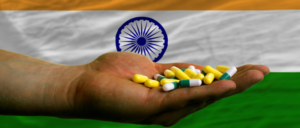In January 2012 I began studying for a cross-disciplinary PhD supervised by David Clark and Sandy Whitelaw from the End of Life Studies Team at the University of Glasgow’s Dumfries Campus. My thesis, entitled ‘The Treatment of Pain in India: power and practice’, was borne from the notion that global health improvement initiatives, despite being described as ‘international’ frequently originate from western countries and lack detailed appreciation of local practice in other regions which they seek to influence.
Having trained as a medical doctor I found my PhD incredibly stimulating intellectually, as I embraced entirely unfamiliar fields of academia, familiarising myself with novel philosophical and methodological concepts. The data collection itself was a sheer joy to carry out, involving several trips to India where I was frequently overwhelmed by the hospitality and generosity of time and knowledge shown by study participants, friends and colleagues.
My academic journey has, however, not been without its difficulties. Throughout my studies I have been a part-time student living in the UK and continued to work as a full-time NHS consultant in anaesthesia and pain management. Whilst I have enjoyed the trips to Scotland – a break from the distractions of home and work, adorned with spectacular geographical scenery (snow-capped fells of the Lake District, moments of great light and beauty on the Solway coast, and devastating flood-waters of Carlisle) I have missed the camaraderie of being in close proximity to other researchers on a day-to-day basis.
I frequently find myself exasperated by the narrow outlook of the medical profession, and its unwillingness to accept its own limitations, a key impetus to this project. But as much as I would like to engage my colleagues in discussion my studies have helped me appreciate how difficult this, sometimes overwhelming, task can be – swimming against the tide. Certainly not for the faint hearted, it has at times been, perhaps inevitably, a lonely intellectual path. I grappled with personal moral conflicts related to my role in perpetuating post-colonial power differentials by the very act of carrying out this research. I have gone through moments of utter despair, and terror – particularly as I put pen to paper and began to write my thesis – is this of interest to anyone, what have I been doing for the last 6 years, do I have the intellectual capacity and stamina to really complete this, how will I survive the viva?
I finally submitted my thesis in January 2018 on the auspicious date of Burns Night and the eve of India Republic Day but the relief was overshadowed as the foreboding viva drew ever closer. I had found my voice on an issue I felt to be of vital importance, given up several years of my life, invested effort and money, others had given freely of their time and knowledge – and it was to be publically, and fastidiously critiqued. But, as I now reflect on the process, despite its gruelling nature, it was actually strangely enjoyable. An opportunity to take my ideas forward, rigorously test them and ultimately justify my position. Despite their ultimate request for corrections to my thesis, one examiner’s comment on the importance of disseminating my work was the prize I was ultimately aspiring to and the culmination of 6 years work.
During the project I have encountered many significant personal events, I have relocated from Wakefield to Windsor having found a wonderful husband but sadly lost my mother. Strangely, my PhD has felt like a constant, reassuring companion and I shall no doubt miss it. But, I am now fortunate to have been invited to speak at many conferences in the UK and overseas, and I am thoroughly enjoying reaping the benefits of this hard work and sharing my ideas.
Two days after I began composing this piece, I received news from the University that my corrected thesis had received final approval from the examiners and I can now, declare myself to be a ‘real’ doctor. The number of letters that already follow my name convey a personal story, and I have declined to receive all of my degrees in person, but this is one I undoubtedly shall be travelling north of the border to collect.


